|
|
|
|
|
|
|
|
|
|
|
|
|
 |
 |
 |
 |
|
 |
 |
 |
 |
|
|
Recognition is important to young boys. The Cub Scouting advancement plan provides fun for the boys, gives them a sense of personal achievement as they earn badges, and strengthens family understanding as adult family members work with boys on advancement projects. Bobcat. The Bobcat rank is for all boys who join Cub Scouting. Tiger Cub. The Tiger Cub program is for first-grade (or age 7) boys and their adult partners. There are five Tiger Cub achievement areas. The Tiger Cub, working with his adult partner, completes 15 requirements within these areas to earn the Tiger Cub badge. These requirements consist of an exciting series of indoor and outdoor activities just right for a boy in the first grade. Wolf. The Wolf program is for boys who have completed first grade (or are age 8). To earn the Wolf badge, a boy must pass 12 achievements involving simple physical and mental skills. Bear. The Bear rank is for boys who have completed second grade (or are age 9). There are 24 Bear achievements in four categories. The Cub Scout must complete 12 of these to earn the Bear badge. These requirements are somewhat more difficult and challenging than those for Wolf rank. Webelos. This program is for boys who have completed third grade (or are age 10). A boy may begin working on the Webelos badge as soon as he joins a Webelos den. This is the first step in his transition from the Webelos den to the Boy Scout troop. As he completes the requirements found in the Webelos Handbook, he will work on activity badges, attend meetings led by adults, and become familiar with the Boy Scout requirements—all leading to the Arrow of Light Award. Activities Cub Scouting means "doing." Everything in Cub Scouting is designed to have the boys doing things. Activities are used to achieve the aims of Scouting—citizenship training, character development, and personal fitness. Many of the activities happen right in the den and pack. The most important are the weekly den meetings and the monthly pack meetings. | |
|
 |
 |
|
 |
 |
 |
 |
 |
 |
 |
 |
|
 |
 |
 |
 |
|
|
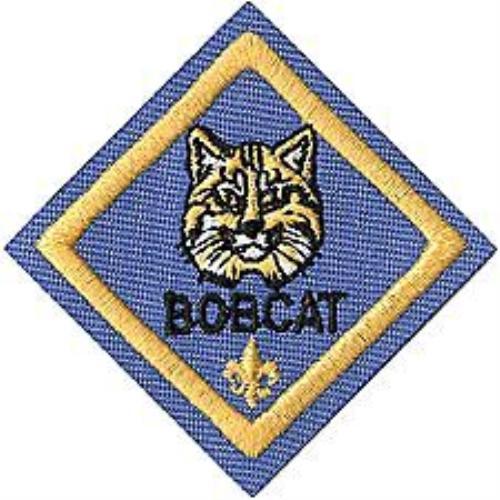
Whenever a boy joins Cub Scouts, the first rank he must earn is the Bobcat rank regardless of his age. So, if he’s a seven year old joining a Tiger Cub den or if he is a ten year old joining a Webelos den, he must earn his Bobcat before he works on anything else. The Bobcat rank can be earned very quickly – often in just one or two den meetings. This means that every new Cub Scout will get a rank badge shortly after joining. There’s nothing like seeing those little first grade Tiger Cubs receive their first badge! To earn the Bobcat rank, the boys must demonstrate knowledge of the following: 1. Cub Scout Promise
“I …..(name)…. promise to do my best
To do my duty to God and my country,
To help other people, and
To obey the Law of the Pack. “ 2. Law of the Pack
“The Cub Scout follows Akela.
The Cub Scout helps the pack go.
The pack helps the Cub Scout grow.
The Cub Scout gives goodwill.” 3. Meaning of “Webelos”
“WE’ll BE LOyal Scouts” 4. Cub Scout Sign
The Cub Scout sign should be given when repeating the Cub Scout Promise or Law of the Pack.

This symbolizes the two alert ears of the wolf and is used by the boys to show that they are ready to listen.
5. Cub Scout Handshake
The Cub Scout handshake is used by Cubs and leaders to show that those who use it help others and obey the Law of the Pack.
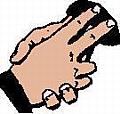
To do the handshake, put the index and middle fingers of the right hand against the other person’s wrist when shaking hands. 6. Cub Scout Motto
“Do Your Best.” 7. Cub Scout Salute
The Cub Scout salute is used to salute the flag when in uniform and to show respect to den and pack leaders.
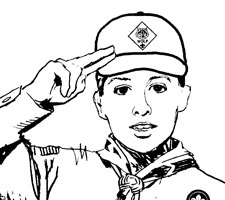 To make the salute, the boy joins the index and middle fingers of the right hand (holding the other fingers with the thumb) and touches the extended fingers to the cap visor or forehead.
8. Parent or guardian review How to Protect Your Children from Child Abuse booklet with your son. |
|
 |
 |
|
 |
 |
 |
 |
 |
 |
 |
 |
|
 |
 |
 |
 |
|
|
Starting the path to the Tiger Cub Rank, a scout first earns the Bobcat badge - this is the first step for all Cub Scouts.The Tiger Cub Totem is earned first, when the Tiger Cub fulfills their requirements: - Learn the Cub Scout Motto
- Learn the Cub Scout Sign
- Learn the Cub Scout Salute
The totem can be used to display the beads as he receives them, and are displayed as shown
- An orange bead is presented for each Den requirement
- white for each Family
- black for each Go See It
A yellow 'Tiger Track' disc is presented, only after the Tiger rank is earned, for every group of 10 Electives the scout completes.There are 15 parts of the five separate achievements a tiger cub must complete to earn his badge, these include: - five Family activities
- five Den activities
- and five Go See It outings
Once a boy, or all the boys in a den, earn their Tiger Cub badge, it should be presented to the scout's adult partner at a pack meeting, who then presents it to the boy. |
|
 |
 |
|
 |
 |
 |
 |
 |
 |
 |
 |
|
 |
 |
 |
 |
|
|
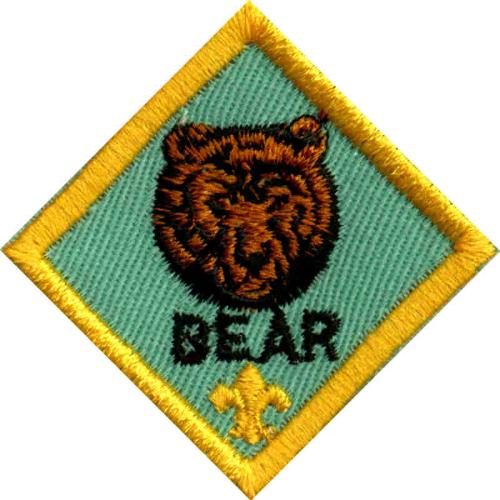
BEAR SCOUT ACHIEVEMENTS GOD (Do ONE of the following)
- WAYS WE WORSHIP
Complete both requirements. - Complete the Character Connection for Faith
- Know. Name some people in history who have shown great faith. Discuss with an adult how faith has been important at a particular point in his or her life.
- Commit. Discuss with an adult how having faith and hope will help you in your life, and also discuss some ways that you can strengthen your faith.
- Practice. Practice your faith as you are taught in your home, church, synagogue, mosque, or religious fellowship.
- Make a list of things you can do this week to practice your religion as you are taught in your home, church, synagogue, mosque, or other religious community. Check them off your list as you complete them.
- EMBLEMS OF FAITH
Complete the requirement.
Earn the Religious Emblem of your faith.
COUNTRY (Do THREE of the following)
- WHAT MAKES AMERICA SPECIAL?
(Do requirements (a) and (j) and any two of the other requirements. - Write or tell what makes America special to you.
- With the help of your family or den leader, find out about two famous Americans. Tell the things they did or are doing to improve our way of life.
- Find out something about the old homes near where you live. Go and see two of them.
- Find out where places of historical interest are located in or near your town or city. Go and visit one of them with your family or den.
- Choose a state; it can be your favorite one or your home state. Name its state bird, tree, and flower. Describe its flag. Give the date it was admitted to the Union.
- Be a member of the color guard in a flag ceremony for your den or pack.
- Display the U.S. flag in your home or fly it on three national holidays..
- Learn how to raise and lower a U.S. flag properly for an outdoor ceremony.
- Participate in an outdoor flag ceremony
- Complete the Character Connection for Citizenship.
- Know. Tell ways some people in the past have served our country. Tell about some people who serve our country today. (Don't forget about 'ordinary' people who serve our country.)
- Commit. Tell something that might happen to you and your family if other people were not responsible citizens. Tell one thing you will do to be a good citizen.
- Practice. Tell three things you did in one week that show you are a good citizen.
- TALL TALES
Do all three requirements. - Tell in your own words what folklore is. List some folklore stories, folk songs, or historical legends from your own state or part of the country. Play the Folklore Match Game in the handbook.
- Name at least five stories about American folklore. Point out on a United States map where they happened.
- Read two folklore stories and tell your favorite one to your den.
- SHARING YOUR WORLD WITH WILDLIFE
Do four of the requirements. - Choose a bird or animal that you like and find out how it lives. Make a poster showing what you have learned.
- Build or make a bird feeder or birdhouse and hang it in a place where birds can visit safely.
- Explain what a wildlife conservation officer does.
- Visit one of the following:
Zoo, Nature center, Aviary, Wildlife refuge, Game preserve. - Name one animal that has become extinct in the last 100 years. Tell why animals become extinct. Name one animal that is on the endangered species list.
- TAKE CARE OF YOUR PLANET
Do three requirements. - Save 5 pounds of glass or aluminum, or 1 month of daily newspapers. Turn them in at a recycling center or use your community's recycling service.
- Plant a tree in your yard, or on the grounds of the group that operates your Cub Scout pack, or in a park or other public place. Be sure to get permission first.
- Call city or county officials or your trash hauling company and find out what happens to your trash after it is hauled away.
- List all the ways water is used in your home. Search for dripping faucets or other ways water might be wasted. With an adult, repair or correct those problems.
- Discuss with an adult in your family the kinds of energy your family uses.
- Find out more about your family's use of electricity.
- Take part in a den or pack neighborhood clean-up project.
- LAW ENFORCEMENT IS A BIG JOB
Do all six requirements. - Practice one way police gather evidence: by taking fingerprints, or taking shoeprints, or taking tire track casts.
- Visit your local sheriff's office or police station or talk with a law enforcement officer visiting your den or pack to discuss crime prevention.
- Help with crime prevention for your home.
- Be sure you know where to get help in your neighborhood.
- Learn the phone numbers to use in an emergency and post them by each phone in your home.
- Know what you can do to help law enforcement.
FAMILY (Do FOUR of the following)
- THE PAST IS EXCITING AND IMPORTANT
Do requirement g and two other requirements. - Visit your library or newspaper office. Ask to see back issues of newspapers or an almanac.
- Find someone who was a Cub Scout a long time ago. Talk with him about what Cub Scouting was like then.
- Start or add to an existing den or pack scrapbook.
- Trace your family back through your grandparents or great-grandparents; or, talk to a grandparent about what it was like when he or she was younger.
- Find out some history about your community.
- Start your own history: keep a journal for 2 weeks.
- Complete the Character Connection for Respect.
- Know. As you learn about how Cub Scout-age life was like for adults you know, does what you learn change what you think about them. Tell how it might help you respect or value them more.
- Commit. Can you think of reasons others might be disrespectful to people or things you value? Name one new way you will show respect for a person or thing someone else values.
- Practice. List some ways you can show respect for people and events in the past.
- WHAT'S COOKING?
Do four requirements. - With an adult, bake cookies.
- With an adult, make snacks for the next den meeting.
- With an adult, prepare one part of your breakfast, one part of your lunch, and one part of your supper.
- Make a list of the 'junk foods' you eat. Discuss 'junk food' with a parent or teacher.
- Make some trail food for a hike.
- With an adult, make a dessert for your family.
- With an adult, cook something outdoors.
- FAMILY FUN
Do both requirements. - Go on a day trip or evening out with members of your family.
- Have a family fun night at home.
- BE READY!
Do requirements a through e and requirement g. Requirement f is recommended, but not required. - Tell what to do in case of an accident in the home. A family member needs help. Someone's clothes catch on fire.
- Tell what to do in case of a water accident.
- Tell what to do in case of a school bus accident.
- Tell what to do in case of a car accident.
- With your family, plan escape routes from your home and have a practice drill.
- Have a health checkup by a physician (optional).
- Complete the Character Connection for Courage.
- Know. Memorize the courage steps: Be brave, Be calm, Be clear, and Be careful. Tell why each courage step is important. How will memorizing the courage steps help you to be ready?
- Commit. Tell why it might be difficult to follow the courage steps in an emergency situation. Think of other times you can use the courage steps. (Standing up to a bully is one example.)
- Practice. Act out one of the requirements using these courage steps: Be brave, Be calm, Be clear, and Be careful.
- FAMILY OUTDOOR ADVENTURE
Do three requirements. - Go camping with your family.
- Go on a hike with your family.
- Have a picnic with your family.
- Attend an outdoor event with your family.
- Plan your outdoor family day.
- SAVING WELL, SPENDING WELL
Do four requirements. - Go grocery shopping with a parent or other adult member of your family.
- Set up a savings account.
- Keep a record of how you spend money for 2 weeks.
- Pretend you are shopping for a car for your family.
- Discuss family finances with a parent or guardian.
- Play a board game with your family that involves the use of play money.
- With an adult, figure out how much it costs for each person in your home to eat one meal.
SELF (do FOUR of the following)
- RIDE RIGHT
Do requirement (a) and three other requirements. - Know the rules for bike safety. If your town requires a bicycle license, be sure to get one.
- Learn to ride a bike, if you haven't by now. Show that you can follow a winding course for 60 feet doing sharp left and right turns, a U-turn, and an emergency stop.
- Keep your bike in good shape. Identify the parts of a bike that should be checked often.
- Change a tire on a bicycle.
- Protect your bike from theft. Use a bicycle lock.
- Ride a bike for 1 mile without rest. Be sure to obey all traffic rules.
- Plan and take a family bike hike.
- GAMES, GAMES, GAMES!
Do two requirements. - Set up the equipment and play any two of these outdoor games with your family or friends.
(Backyard golf, Badminton, Croquet, Sidewalk shuffleboard, Kickball, Softball, Tetherball, Horseshoes, Volleyball) - Play two organized games with your den.
- Select a game that your den has never played. Explain the rules. Tell them how to play it, and then play it with them.
- BUILDING MUSCLES
Do all three requirements. - Do physical fitness stretching exercises. Then do curl-ups, push-ups, the standing long jump, and the softball throw.
- With a friend about your size, compete in at least six different two-person contests. (Many examples in book.)
- Compete with your den or pack in the crab relay, gorilla relay, 30-yard dash, and kangaroo relay.
NOTE TO PARENTS: If a licensed physician certifies that the Cub Scout's physical condition for an indeterminable time doesn't permit him to do three of the requirements in this achievement, the Cubmaster and pack committee may authorize substitution of any three Arrow Point electives. - INFORMATION, PLEASE
Do requirement (a) and three more requirements. - With an adult in your family, choose a TV show. Watch it together.
- Play a game of charades at your den meeting or with your family at home.
- Visit a newspaper office, or a TV or radio station and talk to a news reporter.
- Use a computer to get information. Write, spell-check, and print out a report on what you learned.
- Write a letter to a company that makes something you use. Use e-mail or the U.S. Postal Service.
- Talk with a parent or other family member about how getting and giving facts fits into his or her job.
- JOT IT DOWN
Do requirement h and four other requirements. - Make a list of the things you want to do today. Check them off when you have done them.
- Write two letters to relatives or friends.
- Keep a daily record of your activities for 2 weeks.
- Write an invitation to someone.
- Write a thank-you note.
- Write a story about something you have done with your family.
- Write about the activities of your den.
- Complete the Character Connection for Honesty.
- Know. Tell what made it difficult to be clear and accurate as you wrote details and kept records, and tell what could tempt you to write something that was not exactly true. Define honesty.
- Commit. Tell why it is important to be honest and trustworthy with yourself and with others. Imagine you had reported something inaccurately and tell how you could set the record straight. Give reasons that honest reporting will earn the trust of others.
- Practice. While doing the requirement for this achievement, be honest when you are writing about real events.
- SHAVINGS AND CHIPS
Do all four requirements. - Know the safety rules for handling a knife.
- Show that you know how to take care of and use a pocketknife.
- Make a carving with a pocketknife. Work with your den leader or other adult when doing this.
- Earn the Whittling Chip card.
- SAWDUST AND NAILS
Do all three requirements. - Show how to use and take care of four of these tools.
(Hammer, Hand saw, Hand drill, C-clamp, Wood plane, Pliers, Crescent wrench, Screwdriver, Bench vise, Coping saw, Drill bit) - Build your own tool box.
- Use at least two tools listed in requirement (a) to fix something.
- BUILD A MODEL
Do requirement g and two other requirements. - Build a model from a kit.
- Build a display for one of your models.
- Pretend you are planning to change the furniture layout in one of the rooms in your home.
- Make a model of a mountain, a meadow, a canyon, or a river.
- Go and see a model of a shopping center or new building that is on display somewhere.
- Make a model of a rocket, boat, car, or plane.
- Complete the Character Connection for Resourcefulness.
- Know. Review the requirements for this achievement and list the resources you would need to complete them. Then list the materials you could substitute for items that you do not already have. Tell what it means to be resourceful.
- Commit. After you complete the requirements for this achievement, list any changes that would make the results better if you did these projects again. Tell why it is important to consider all available resources for a project.
- Practice. While you complete the requirements for this achievement, make notes on which materials worked well in your projects and why.
- TYING IT ALL UP
Do five requirements. - Whip the ends of a rope.
- Tie a square knot, bowline, sheet bend, two half hitches, and slip knot. Tell how each knot is used.
- Learn how to keep a rope from tangling.
- Coil a rope. Throw it, hitting a 2-foot square marker 20 feet away.
- Learn a magic rope trick.
- Make your own rope.
- SPORTS, SPORTS, SPORTS
Do all five requirements. - Learn the rules of and how to play three team sports.
- Learn the rules of and how to play two sports in which only one person is on each side.
- Take part in one team and one individual sport.
- Watch a sport on TV with a parent or some other adult member of your family.
- Attend a high school, college, or professional sporting event with your family or your den.
- BE A LEADER
Do requirement f and two other requirements. - Help a boy join Cub Scouting, or help a new Cub Scout through the Bobcat trail.
- Serve as a denner or assistant denner.
- Plan and conduct a den activity with the approval of your den leader.
- Tell two people they have done a good job.
- Leadership means choosing a way even when not everybody likes your choice.
- Complete the Character Connection for Compassion.
- Know. Tell why, as a leader, it is important to show kindness and concern for other people. List ways leaders show they care about the thoughts and feelings of others.
- Commit. Tell why a good leader must consider the ideas, abilities, and feelings of others. Tell why it might be hard for a leader to protect another person's well-being. Tell ways you can be kind and compassionate.
- Practice. While you complete the requirements for this achievement, find ways to be kind and considerate of others.
|
|
 |
 |
|
 |
 |
 |
 |
 |
 |
 |
 |
|
 |
 |
 |
 |
|
|
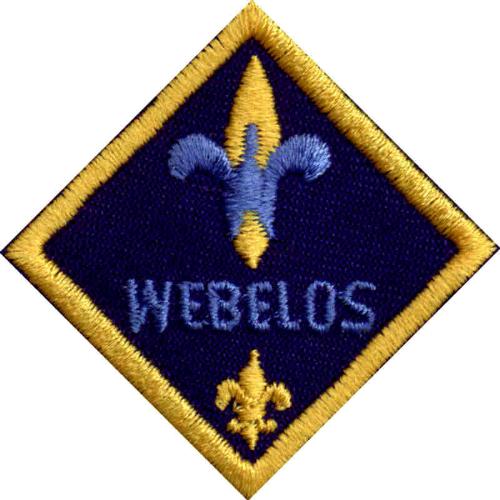 1. Have an adult member of your family read and sign the Parent Guide in the front of the Webelos Scout Book. 2. Bean active member of your Webelos den for 3 months. 3. Know and explain the meaning of the Webelos badge. 4. Point out and explain the three parts of the Webelos Scout uniform. Tell when to wear the uniform and when not to wear it. 5. Earnthe Fitness and Citizen activity badges and one other activity badge from a different activity badge group. 6. Plan and lead a flag ceremony in your den that includes the U.S. flag. 7. Show that you know and understand the requirements to be a Boy Scout. a.Demonstrate the Scout salute, Scout sign, and Scout handshake. Explain when you would use them. b.Explain the Scout Oath, Scout Law, Scout motto,and Scout slogan. c.Explain and agree to follow the Outdoor Code. 8. Faith After completing the rest of requirement 8,do these (a, b, and c): a.Know: Tell what you have learned about faith. b.Commit: Tell how these faith experiences help you live your duty to God. Name one faith practice that you will continue to do in the future. c.Practice: After doing these requirements, tell what you have learned about your beliefs. And do one of these (d OR e): d.Earn the religious emblem of your faith* e.Do two of these: (Use this Worksheet to track activity) § Attend the church, synagogue, temple, or other religious organization of your choice, talk with your religious leader about your beliefs. Tell your family and your Webelos den leader what you learned. § Discuss with your family and Webelos den leader how your religious beliefs fit in with the Scout Oath and Scout Law, and what character-building traits your religious beliefs have in common with the Scout Oath and Scout Law. § With your religious leader, discuss and make a plan to do two things you think will help you draw nearer to God. Do these things for a month. § For at least a month, pray or meditate reverently each day as taught by your family, and by your church, temple, mosque, synagogue, or religious group. § Under the direction of your religious leader, do an act of service for someone else.Talk about your service with your family and Webelos den leader. Tell them how it made you feel. § List at least two ways you believe you have lived according to your religious beliefs. 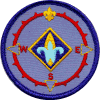
Compass Points Emblem Requirements 1. Earnthe Webelos Badge. 2. Earnfour more activity badges for a total of seven to receive the compass pointsemblem. 3. Earnone compass point pin for each additional four activity badges. § 11activity badges – first point § 15activity badges – second point § 19activity badges – third point
|
|
 |
 |
|
 |
 |
 |
 |
 |
 |
 |
 |
|
 |
 |
 |
 |
|
|
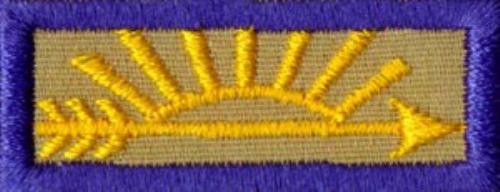 The highest award in Cub Scouts is earned by Webelos that have been active participants in their den and are ready to join a Boy Scout troop. Many of the requirements for the Arrow of Light are intended to familiarize the scout with a local troop and hopefully show him that crossing over into a troop is the next step to take in scouting. A scout that earns his Arrow of Light patch has also completed nearly all the requirements to earn the Scout badge in the troop so he has already begun his Boy Scout trail. 1. Be active in your Webelos den for at least six months since completing the fourth grade (or for at least six months since becoming 10 years old), and earn the Webelos badge. 2. Show your knowledge of the requirements to become a Boy Scout by doing all of these: § Repeat from memory and explain in your own words the Scout Oath or Promise and the 12 points of the Scout Law. Tell how you have practiced them in your everyday life. § Give and explain the Scout motto, slogan, sign, salute, and handshake. § Understand the significance of the First Class Scout badge. Describe its parts and tell what each stands for. § Tell how a Boy Scout uniform is different from a Webelos Scout uniform. § Tiethe joining knot (square knot) 3. Earn five more activity badges in addition to the three you already earned for the Webelos badge. These must include: § Fitness(already earned for the Webelos badge) § Citizen(already earned for the Webelos badge) § One of your choice (already earned for the Webelos badge) § Readyman § Outdoorsman § At least one from the Mental Skills Group § At least one from the Technology Group § One more of your choice 4. With your Webelos den, visit at least § one Boy Scout troop meeting, and § one Boy Scout-oriented outdoor activity. 5. Participate in a Webelos overnight camp out or day hike. 6. After you have completed all five of the above requirements, and after a talk withyour Webelos den leader, arrange to visit, with your parent or guardian, a meeting of a Boy Scout troop you think you might like to join. Have aconference with the Scoutmaster. 7. Complete the Honesty Character Connection. a.Know: Say the Cub Scout Promise to your family.Discuss these questions with them. What is a promise? What does it mean to keep your word? What does it mean to be trustworthy? What does honesty mean? b.Commit: Discuss these questions with your family. Why is a promise important? Why is it important for people to trust you when you give your word? When might it be difficult to be truthful? List examples. c.Practice: Discuss with a family member why it is important to be trustworthy and honest. How can you do your best to be honest even when it is difficult? |
|
 |
 |
|
 |
 |
 |
 |
|
|
|
|
|
|
|
|
|